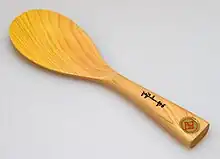

A shamoji (しゃもじ, 杓文字) or rice paddle is a large flat spoon used in East Asian cuisine. It is used to stir and to serve rice, and to mix vinegar into the rice for sushi.
Shamoji are traditionally made from bamboo, wood, or lacquer, and nowadays often from plastic. The shamoji is dipped in water frequently during use to prevent rice from sticking to it. Some expensive plastic shamoji have non-stick surfaces. Metal is rarely used, as this is more likely to cut rice grains or to damage the hangiri wooden tub traditionally used for mixing.
It is said to have been first devised by a monk on Itsukushima, Hiroshima Prefecture. The word is an example of nyōbō kotoba, being derived from the first part of shakushi (杓子, "ladle"), plus the moji (文字, "character") suffix.[1]
Modern rice cookers may include a shamoji in the box, usually made of white plastic.
Shamoji are also used to crush vegetables, such as garlic and cucumbers, as cleavers are used in Western cuisine.
The shamoji has also been a symbol of unity between the mother and wife in Japanese society. In one tradition, it was passed down from one generation to the next to symbolize the family duties that were handed down.[2]

In Japan, the shamoji is also a good luck charm dedicated to Shinto shrines and decorated with the word "hissho" (必勝, victory) written on the part that scoops up rice when praying for victory. This is because the Japanese word "meshitoru" (飯取る), which means to scoop up rice, is pronounced the same as "meshitoru" (召し捕る), which means to capture the enemy. The custom became even more famous during the Russo-Japanese War, when soldiers dedicated many shamoji to Itsukushima Shrine to pray for Japan's victory in the war.[3] In March 2023, Prime Minister Fumio Kishida visited Ukraine and presented President Volodymyr Zelenskyy with a shamoji with the word "hissho" (必勝, victory) written on it to pray for Ukraine's victory over Russia in the Russo-Ukrainian War.[4]
See also
References
- ↑ 杓文字(しゃもじ) - 語源由来辞典
- ↑ "Contemporary Japan: Culture & Society". 2004.
- ↑ 地元広島の名産品「必勝しゃもじ」岸田首相がゼレンスキー大統領に贈呈 日露戦争勝利時の縁起物 (in Japanese). Yahoo Japan News/Nikkan Sports. 23 March 2023. Archived from the original on 23 March 2023. Retrieved 24 March 2023.
- ↑ "Kishida gave gifts symbolizing victory, peace to Zelenskyy". The Asahi Shimbun. 24 March 2023. Archived from the original on 24 March 2023. Retrieved 24 March 2023.